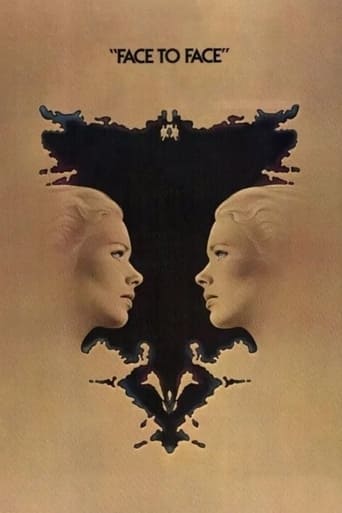Richard Chatten
Ingmar Bergman treats Liv Ullmann to a star turn worthy of Joan Crawford in her heyday which culminates in an emotional outburst that Ullmann doubtless had a blast filming, and earned her an Oscar nomination.You know Ullmann's drama-queen suicide attempt will be unsuccessful, otherwise the TV series this originally was would have abruptly ended at the start of episode three when she downs the pills; and would have had to relocate to the next world. In a way it does, since when she wakes up in hospital, delirium sets in, in a manner recalling Doris Svedlund's dream sequence in 'Fängelse' (1949), with Ullmann drifting about dressed in red as in 'Cries and Whispers'.In his thirty years since his debut as a director, Bergman had long ago lost his interest in depicting the lives of blue-collar workers, and ' Face to Face' occupies the rarified world of affluent professional people, so we see hardly any staff in the hospital in which Ullmann's been billeted; and nobody comes to investigate her shouting.
Christopher Culver
Shot in 1975, originally for Swedish television, Ingmar Bergman's film ANSIKTE MOT ANSIKTE (Face to Face) explores the idea of a psychiatrist herself struggling with mental illness.As the film opens, Dr. Jenny Isaksson (Liv Ullmann) is standing in an empty house, her family having removed everything in preparation for a move into a new house later that year. In the meantime, her husband is working in America for a few months and her daughter is at a summer camp. Waiting for the family to be reunited and move into the new house, Jenny temporarily settles in with her grandmother (Aino Taube) and grandfather (Gunnar Björnstrand), the latter of whom is poignantly suffering from dementia. Jenny is initially happy to dedicate herself to a new position at the clinic, but soon she finds the wall between reality and delusion breaking down, and the film chronicles her deterioration.I personally don't consider ANSIKTE MOT ANSIKTE "major Bergman". Firstly, the cut theatrical version feels sputtering and unfocused and consequently its 2-hour length can seem interminable. Sadly, the original television version has never been released, so neither can audiences have that. Secondly, Bergman had made a few films before that dealt with madness or the dark regions of the psyche, and especially in the second half of ANSIKTE MOT ANSIKTE the director resorts to what had already become some clichés for him.Still, even second-rate Bergman is worth at least one viewing. In spite of often retreading past ground in showing us what's in Jenny's head, Bergman does at times give us a fresh angle on the theme of mental illness, attempting to convey how much loneliness and shame it involves. Jenny is wracked with emotion but unable to communicate it to those around her, and she feels utterly alone as even those close to her fail to understand her plight. The acting is also superb, with Liv Ullman able to portray a whole spectrum of mental states. Erland Josephson appears in a supporting role, one of the threatening, Mephistophelian characters he did so well.There is, incidentally, one aspect of this film that makes it a real curiosity in Bergman's body of work. Over the preceding couple of decades, Bergman had shot films that were either period films (medieval or early 20th century) or were fairly contained dramas about small, mainly upper-class circles, with little representation of broader society and changing mores. Here, however, the outside world suddenly and rather crudely intrudes on a Bergman film: early on, Jenny attends a party thrown by a campy, somewhat Cathy Berberian-like, elderly woman (Sif Ruud) who dotes on a pair of gay men that she has quasi-adopted. The two men are homosexual stereotypes, sashaying, tight jeans and all, and the party involves some sexually libertine folk dancing to Abba-like pop music of the time. One gets the impression that Bergman was feeling challenged by younger filmmakers like Vilgot Sjöman, but this sudden reflection of 1970s Sweden quickly disappears and the film returns to more traditional Bergman territory.
TheLittleSongbird
I love and greatly admire Ingmar Bergman, Sweden's greatest director by default, and his films. Face to Face is not one of his very best, but of a generally highly impressive resume it is up there as one of the better ones. Sven Nykvist's cinematography is both gorgeous and atmospheric, and the nightmarish dream sequences are really striking. The dialogue as you would except from a Bergman film really makes you think, Bergman's direction is superb and the story is dark, harrowing and hugely personal. Erland Josephson provides an ideal counter-point to Liv Ullman. Bergman regular Gunnar Bjornstrand's role is very short but he does leave an impression. The best asset of Face to Face is easily the extraordinary performance of Liv Ullman, I have yet to see a bad performance from her and this for me was one of her best ever, enormously intense, very commanding and her eyes are as expressive as they ever were. She is especially good in the telling of the attempted rape, which had so many complex emotions, all of them nailed. In conclusion, Face to Face is one of Bergman's better films, if not one of the finest among the likes of The Seventh Seal and Fanny and Alexander, lifted by Ullman's performance. 10/10 Bethany Cox




